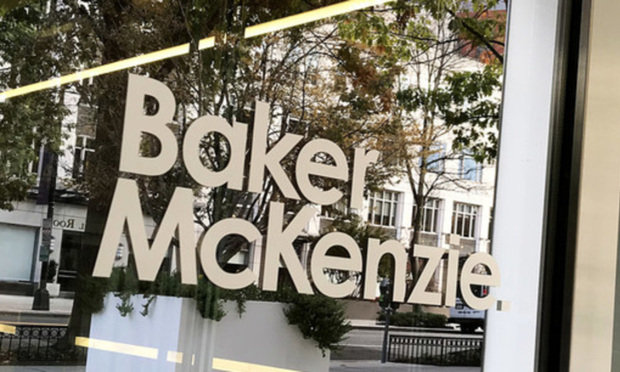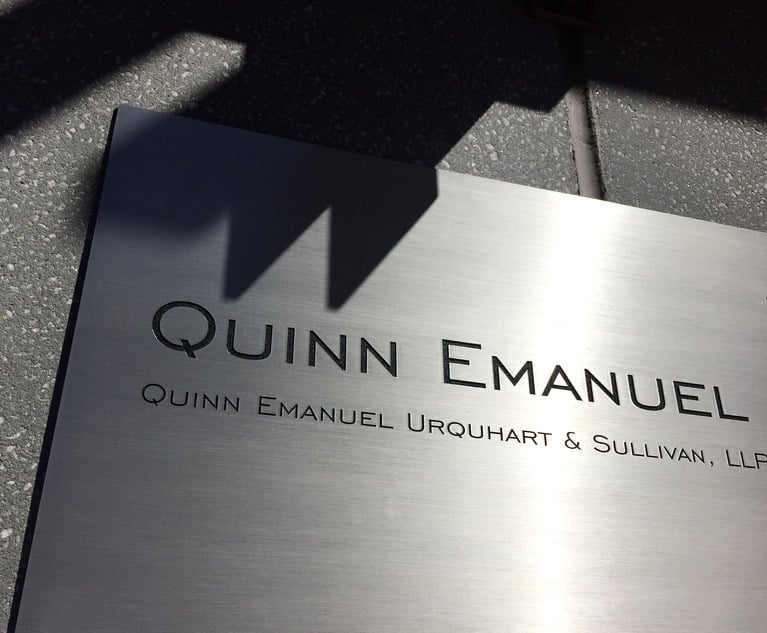Baker McKenzie Adopts Black Box System for U.S. Equity Partner Pay
The global legal giant quietly implemented a closed compensation system for its equity partners across its offices in North America last August.
March 12, 2019 at 05:30 AM
3 minute read
The original version of this story was published on The American Lawyer
 Baker McKenzie offices in Washington, D.C. Photo: Diego M. Radzinschi/ALM
Baker McKenzie offices in Washington, D.C. Photo: Diego M. Radzinschi/ALM
Baker McKenzie quietly moved to a black box compensation system for its equity partnership in North America at the end of last summer, Legal Week sister title The American Lawyer has learned.
The leadership of the 4,719-lawyer firm made the change to its equity partner compensation model following the end of its 2018 fiscal year, which ran from July 1, 2017, to June 30 of last year, said multiple sources with knowledge of the firm's decision.
Baker McKenzie declined to comment.
The global legal giant began rolling out its decision in August 2018, alerting partners of the change via email with a subsequent conference call coming later that month to discuss the changes in its North America compensation model, sources said.
In closed or so-called black box systems, partners' compensations are typically determined by managing partners or management committees, and their compensation is not shared with anyone else at the firm.
Baker McKenzie's recent switch is a departure from the previous open and transparent model the firm had implemented for its equity partners for many years, said sources familiar with the matter.
With the change to a closed compensation model, Baker McKenzie joins the ranks of other large law firms that have a black box model, such as Greenberg Traurig, Jones Day, Sidley Austin and Snell & Wilmer.
And like other compensation approaches, there are benefits and disadvantages to the black box system.
Closed compensation models can promote collaboration and prevent in-fighting about partner pay. They can also be useful for recruitment because they have more flexibility to give lateral partners premiums without upsetting the rest of the partnership, said Meredith Frank, a recruiter and managing director at Major, Lindsey & Africa.
However, with the lack of transparency in a closed system, there could be a fear that this will lead to unfairness in compensation decisions, she said.
"It is very challenging for firms to go from a totally open comp system to a closed comp system," Frank added. "I think it's probably easier to go in the opposite direction."
But there are firms that have recently headed in that direction other than Baker McKenzie. Fried, Frank, Harris, Shriver & Jacobson overhauled its compensation system and adopted a partial black box model for partner compensation in recent years.
Frank said she would be surprised if other law firms followed suit. Partners already in open models typically prefer open compensation systems, while those often in closed systems prefer more transparency, Frank said.
According to Major Lindsey's 2018 Partner Compensation Survey, partners in open compensation systems report higher average compensation, higher average origination and are more likely to classify themselves very satisfied with their compensation transparency than partners in partially open or closed systems.
And when it came to change, 69 percent of partners in closed compensation systems said they would like to see aspects of their compensation change. This is compared with 60 percent of total respondents who said they wanted to see some change.
"I don't think we're going to see this trend [of adopting closed systems] and if anything I think the statistics and the data that we've amassed in our compensation surveys would lead me to conclude that at some point some firms may move in the opposite direction," she added.
This content has been archived. It is available through our partners, LexisNexis® and Bloomberg Law.
To view this content, please continue to their sites.
Not a Lexis Subscriber?
Subscribe Now
Not a Bloomberg Law Subscriber?
Subscribe Now
NOT FOR REPRINT
© 2025 ALM Global, LLC, All Rights Reserved. Request academic re-use from www.copyright.com. All other uses, submit a request to [email protected]. For more information visit Asset & Logo Licensing.
You Might Like
View All
X Ordered to Release Data by German Court Amid Election Interference Concerns

Compliance With the EU's AI Act Lags Behind as First Provisions Take Effect

Quinn Emanuel's Hamburg Managing Partner and Four-Lawyer Team Jump to Willkie Farr

Trump ICC Sanctions Condemned as ‘Brazen Attack’ on International Law
Trending Stories
- 1ACC CLO Survey Waves Warning Flags for Boards
- 2States Accuse Trump of Thwarting Court's Funding Restoration Order
- 3Microsoft Becomes Latest Tech Company to Face Claims of Stealing Marketing Commissions From Influencers
- 4Coral Gables Attorney Busted for Stalking Lawyer
- 5Trump's DOJ Delays Releasing Jan. 6 FBI Agents List Under Consent Order
Who Got The Work
J. Brugh Lower of Gibbons has entered an appearance for industrial equipment supplier Devco Corporation in a pending trademark infringement lawsuit. The suit, accusing the defendant of selling knock-off Graco products, was filed Dec. 18 in New Jersey District Court by Rivkin Radler on behalf of Graco Inc. and Graco Minnesota. The case, assigned to U.S. District Judge Zahid N. Quraishi, is 3:24-cv-11294, Graco Inc. et al v. Devco Corporation.
Who Got The Work
Rebecca Maller-Stein and Kent A. Yalowitz of Arnold & Porter Kaye Scholer have entered their appearances for Hanaco Venture Capital and its executives, Lior Prosor and David Frankel, in a pending securities lawsuit. The action, filed on Dec. 24 in New York Southern District Court by Zell, Aron & Co. on behalf of Goldeneye Advisors, accuses the defendants of negligently and fraudulently managing the plaintiff's $1 million investment. The case, assigned to U.S. District Judge Vernon S. Broderick, is 1:24-cv-09918, Goldeneye Advisors, LLC v. Hanaco Venture Capital, Ltd. et al.
Who Got The Work
Attorneys from A&O Shearman has stepped in as defense counsel for Toronto-Dominion Bank and other defendants in a pending securities class action. The suit, filed Dec. 11 in New York Southern District Court by Bleichmar Fonti & Auld, accuses the defendants of concealing the bank's 'pervasive' deficiencies in regards to its compliance with the Bank Secrecy Act and the quality of its anti-money laundering controls. The case, assigned to U.S. District Judge Arun Subramanian, is 1:24-cv-09445, Gonzalez v. The Toronto-Dominion Bank et al.
Who Got The Work
Crown Castle International, a Pennsylvania company providing shared communications infrastructure, has turned to Luke D. Wolf of Gordon Rees Scully Mansukhani to fend off a pending breach-of-contract lawsuit. The court action, filed Nov. 25 in Michigan Eastern District Court by Hooper Hathaway PC on behalf of The Town Residences LLC, accuses Crown Castle of failing to transfer approximately $30,000 in utility payments from T-Mobile in breach of a roof-top lease and assignment agreement. The case, assigned to U.S. District Judge Susan K. Declercq, is 2:24-cv-13131, The Town Residences LLC v. T-Mobile US, Inc. et al.
Who Got The Work
Wilfred P. Coronato and Daniel M. Schwartz of McCarter & English have stepped in as defense counsel to Electrolux Home Products Inc. in a pending product liability lawsuit. The court action, filed Nov. 26 in New York Eastern District Court by Poulos Lopiccolo PC and Nagel Rice LLP on behalf of David Stern, alleges that the defendant's refrigerators’ drawers and shelving repeatedly break and fall apart within months after purchase. The case, assigned to U.S. District Judge Joan M. Azrack, is 2:24-cv-08204, Stern v. Electrolux Home Products, Inc.
Featured Firms
Law Offices of Gary Martin Hays & Associates, P.C.
(470) 294-1674
Law Offices of Mark E. Salomone
(857) 444-6468
Smith & Hassler
(713) 739-1250








